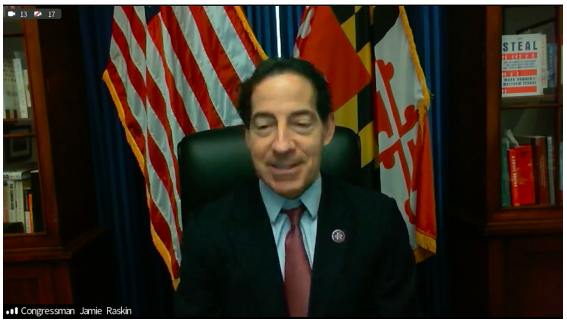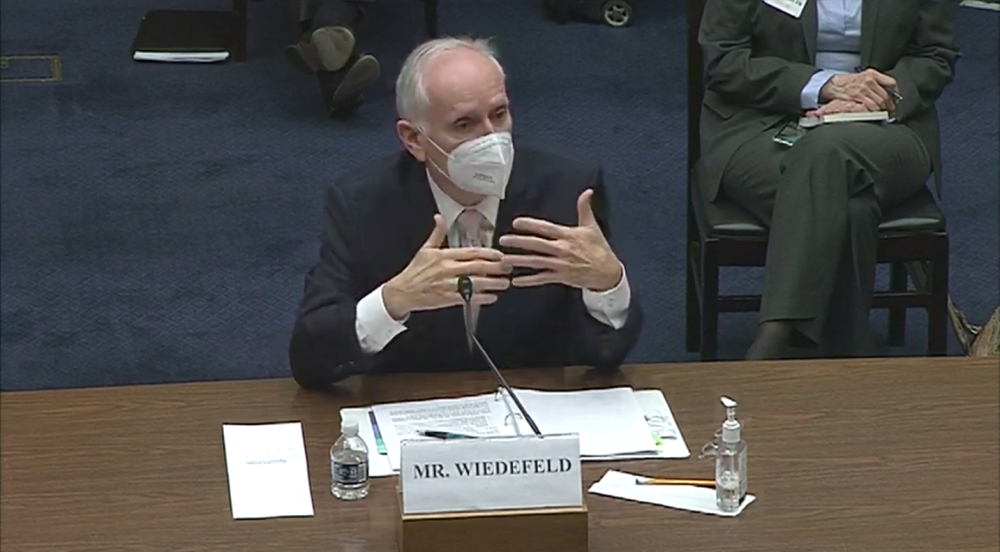WASHINGTON – Maryland Rep. Jamie Raskin on Wednesday questioned why Metro officials concealed for four years mechanical issues with new-model subway cars, warning that the transit system was risking the public’s faith in its safety.
“Safety is obviously a central issue for ridership,” Raskin said at a hearing of the House Oversight and Reform Committee’s government operations subcommittee. “People want it to be beautiful, people want it to be on time, but people are not going to ride it if it’s not safe.”
Washington Metropolitan Area Transit Authority Inspector General Geoffrey Cherrington said that safety issues with the Kawasaki 7000 series cars were treated by Metro as a warranty issue.
Raskin, D-Kensington, challenged Metro’s focus on the manufacturer rather than on its riders.

“That’s like if I’ve got an oven that’s not working and is a fire danger for the house and I just report it to the oven manufacturer,” Raskin said. “I start writing them and I don’t tell anybody in the house that the oven is a danger to life and limb, right?”
Safety concerns for the Kawasaki 7000-series rail cars went back to 2017, according to National Transportation Safety Board (NTSB) investigators and Washington Metrorail Safety Commission (WMSC) CEO David Mayer.
Wheel failures on 7000-series rail cars led to the October 2021 Blue Line derailment, Cherrington said. The wheels had moved two inches and one of the car’s wheels came off the rail during the incident.
Inspectors found that the wheels were farther apart than they should have been and could have led to a “catastrophic incident,” according to a preliminary report by the NTSB.
All 7000-series trains were pulled out of service after the accident and then sidelined again in December after some cars failed to meet inspection requirements.
Cherrington said his office had found “no evidence, so far, that WMATA intentionally withheld information from WMSC regarding the loose wheel conditions affecting 7000-series rail cars.”
After more than six years on the job, Metro General Manager and CEO Paul Wiedefeld is retiring in June.
House Majority Leader Steny Hoyer, D-Mechanicsville, said that once WMATA selects a new general manager, that person will need to work in cooperation with the safety commission to “restore the public’s faith in Metro.”
The Washington region’s public transit network saw an infusion of $2.4 billion in emergency aid during the coronavirus pandemic, a sum that “allowed the system to close its operating deficit for three consecutive years,” Rep. Gerald Connolly, D-Virginia, said.
But Metro is projecting a deficit of $519 million in fiscal 2024.
David Ditch, a policy analyst at the Heritage Foundation, a Washington-based conservative think tank, decried what he called a “culture of mediocrity” at WMATA.
He said that “there is no guarantee that ridership will ever again reach 2019 levels, let alone 2010 levels,” and accused the agency of “endlessly throwing good money after bad.”
“When you’re in a hole, stop digging,” Ditch said.
Rep. Katie Porter, D-California, pressed Wiedefeld to discuss what actions have been taken to hold Kawasaki accountable for the problems with the 7000-series cars.
The Metro CEO said he could not comment because the issue is part of the current investigation by the NTSB and the inspectors general of Metro and the U.S. Department of Transportation.
Porter also asked Wiedefeld whether the 7000-series rail cars are indeed defective.
“At this time we, again, we have to wait until this investigation is completed and we will determine…,” Wiedefeld began.
Porter interrupted: “Mr. Wiedefeld, I want to be clear, you don’t have to wait until the investigations clear. You may be choosing to do that.”
“I would certainly hope you would be developing a plan,” she said. “But there’s no requirement that you wait, you can begin negotiations with Kawasaki in the meantime.”


You must be logged in to post a comment.